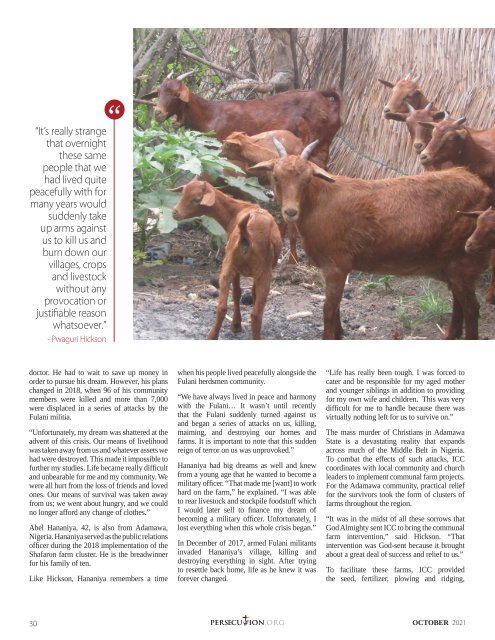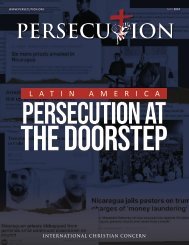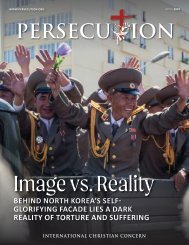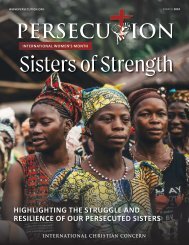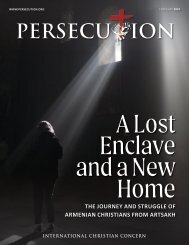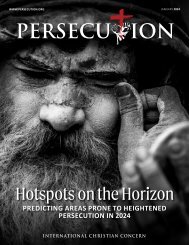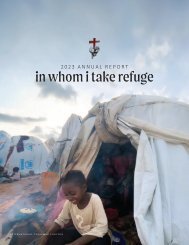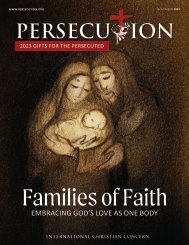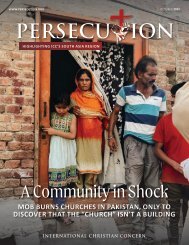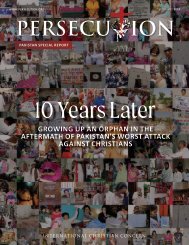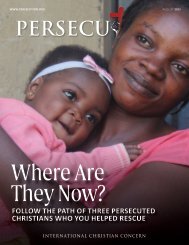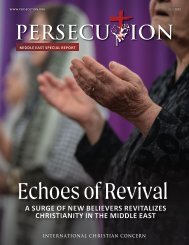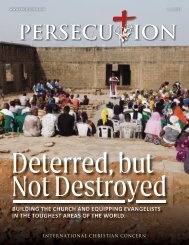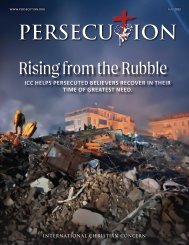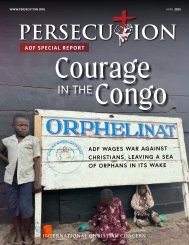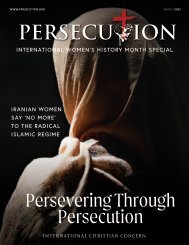October 2021 Persecution Magazine
You also want an ePaper? Increase the reach of your titles
YUMPU automatically turns print PDFs into web optimized ePapers that Google loves.
“It’s really strange<br />
that overnight<br />
these same<br />
people that we<br />
had lived quite<br />
peacefully with for<br />
many years would<br />
suddenly take<br />
up arms against<br />
us to kill us and<br />
burn down our<br />
villages, crops<br />
and livestock<br />
without any<br />
provocation or<br />
justifiable reason<br />
whatsoever.”<br />
- Pwaguri Hickson<br />
doctor. He had to wait to save up money in<br />
order to pursue his dream. However, his plans<br />
changed in 2018, when 96 of his community<br />
members were killed and more than 7,000<br />
were displaced in a series of attacks by the<br />
Fulani militia.<br />
“Unfortunately, my dream was shattered at the<br />
advent of this crisis. Our means of livelihood<br />
was taken away from us and whatever assets we<br />
had were destroyed. This made it impossible to<br />
further my studies. Life became really difficult<br />
and unbearable for me and my community. We<br />
were all hurt from the loss of friends and loved<br />
ones. Our means of survival was taken away<br />
from us; we went about hungry, and we could<br />
no longer afford any change of clothes.”<br />
Abel Hananiya, 42, is also from Adamawa,<br />
Nigeria. Hananiya served as the public relations<br />
officer during the 2018 implementation of the<br />
Shafaron farm cluster. He is the breadwinner<br />
for his family of ten.<br />
Like Hickson, Hananiya remembers a time<br />
when his people lived peacefully alongside the<br />
Fulani herdsmen community.<br />
“We have always lived in peace and harmony<br />
with the Fulani… It wasn’t until recently<br />
that the Fulani suddenly turned against us<br />
and began a series of attacks on us, killing,<br />
maiming, and destroying our homes and<br />
farms. It is important to note that this sudden<br />
reign of terror on us was unprovoked.”<br />
Hananiya had big dreams as well and knew<br />
from a young age that he wanted to become a<br />
military officer. “That made me [want] to work<br />
hard on the farm,” he explained. “I was able<br />
to rear livestock and stockpile foodstuff which<br />
I would later sell to finance my dream of<br />
becoming a military officer. Unfortunately, I<br />
lost everything when this whole crisis began.”<br />
In December of 2017, armed Fulani militants<br />
invaded Hananiya’s village, killing and<br />
destroying everything in sight. After trying<br />
to resettle back home, life as he knew it was<br />
forever changed.<br />
“Life has really been tough. I was forced to<br />
cater and be responsible for my aged mother<br />
and younger siblings in addition to providing<br />
for my own wife and children. This was very<br />
difficult for me to handle because there was<br />
virtually nothing left for us to survive on.”<br />
The mass murder of Christians in Adamawa<br />
State is a devastating reality that expands<br />
across much of the Middle Belt in Nigeria.<br />
To combat the effects of such attacks, ICC<br />
coordinates with local community and church<br />
leaders to implement communal farm projects.<br />
For the Adamawa community, practical relief<br />
for the survivors took the form of clusters of<br />
farms throughout the region.<br />
“It was in the midst of all these sorrows that<br />
God Almighty sent ICC to bring the communal<br />
farm intervention,” said Hickson. “That<br />
intervention was God-sent because it brought<br />
about a great deal of success and relief to us.”<br />
To facilitate these farms, ICC provided<br />
the seed, fertilizer, plowing and ridging,<br />
30 PERSECU ION.ORG<br />
OCTOBER <strong>2021</strong><br />
INTERNATIONAL CHRISTIAN CONCERN


